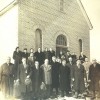At some point, your values will change.
This is a good thing.
When I was growing up, I was incredibly insecure and had a hard time making friends. My primary value was to avoid the shame I felt when I failed to connect with others. By focusing on avoiding the shame of connection, I grew increasingly lonely.

For years, I was embedded in churches that focused on a set of “legalisms,” specific rules that couldn’t be broken. These mainly had to do with language, dress, sexuality and how often we showed up for church. By focusing on rules, I grew rigid and judgemental.
For many churches “success” means a growing number of bodies in seats on Sundays, and a growing budget. By focusing on the numbers, churches often go to ungodly lengths to gather more people.
For fundamentalists (Christian, Muslim, Atheist, etc.) intellectual assent to core beliefs is essential to one’s identity. By focusing on right belief, fundamentalists often will excuse hurtful behavior.
Sadly, what often happens is that our ideals change but behavior does not.
We all know the truism that what you measure is what gets done. Whether we like it or not, our ideals often get trumped by our score card.
So how do we redefine a win when our values have changed? Here’s a five steps that I’ve found helpful: Continue Reading…














 Tweets
Tweets